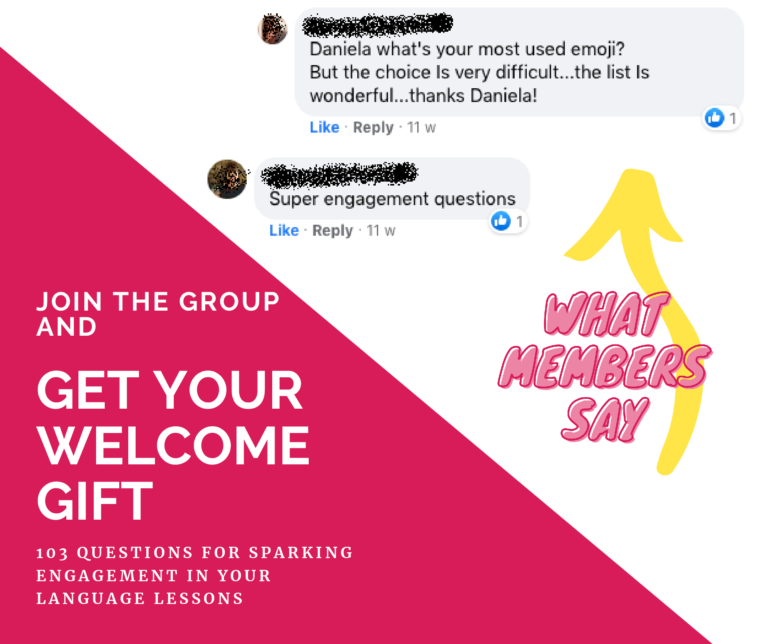
What is sustainable learning and how does it apply to modern languages teaching? Sustainable learning is a recent concept and it mainly refers to embodying topics and resources about sustainability and sustainable development into the teaching of any subjects within the educational settings. In this article I would like to give a different perspective on sustainable learning, specifically with regard to second and foreign language acquisition. In fact, in my opinion, sustainable learning means better, long-lasting, more effective, faster, motivating and joyful learning. It is about the way people learn and how they make the most of their brain/mind resources, rather than about the topics they learn about.
You are going to learn about the following topics:
- What is sustainable learning and sustainable education
- What is sustainable learning in language teaching
- A new perspective on sustainable learning
- The principles sustainable learning is based on
- What is the expected outcome of sustainable learning?
- How fast and how deep can we expect learning to be?
- How can we promote sustainable learning?
What is the most common definition for sustainable learning?
Sustainable learning and education (also known as SLE) is a recent concept and an emerging philosophy in education. I mention a definition for SLE given by the author J. Martin Hays:
The intent of Sustainable Learning and Education is to create and proliferate sustainable and renewable curricula and methods of learning and teaching that instil in people the skills and dispositions to thrive in complicated, challenging, and ever-changing circumstances, while contributing positively to making the world a better place.
Also, UNESCO gives the following definition for sustainable learning:
[quote] Education for Sustainable Development (ESD) empowers learners of all ages with the knowledge, skills, values and attitudes to address the interconnected global challenges we are facing, including climate change, environmental degradation, loss of biodiversity, poverty and inequality.
Could there be a different perspective on the concept of sustainable learning?
In this piece of blog I want to offer a different perspective on the matter. The perspective originates from Suggestopedia as a pedagogy and from its principles. In my opinion, we shall call sustainable any pedagogies and methodologies that:
- rely on learners’ untapped brain/ mind resources
- speed the acquisition process up and make acquisition a far more effective process
- boost learners’ engagement and motivation
- promote meaningful learning.
Through these new lenses, the main focus of sustainable learning is no longer on the topics we cover in the educational curricula. Instead, the focus is on the way teachers design the learning experience, the methods through which learners learn and the results learners achieve as consequence.
What is sustainable learning in language acquisition?
From my point of view, when it comes to foreign or second language teaching, sustainable learning can refer to two different declinations:
- Planning language lessons about social and environmental sustainability (let’s say, as conversation topics) where students would be learning about sustainability by practising the target language. In this sense, the accent is on the topics and the resources teachers choose for the language lessons
- Planning language lessons for promoting sustainable learning. In this sense, sustainable learning means better, long-lasting, more effective, faster, motivating and joyful learning. The accent is therefore on the methodologies, the pedagogical framework. and the expected results.
What are the principles at the basis of sustainable learning?
The foundations come from Suggestopedia: learning (acquisition) is the outcome of methodological choices together with the teachers’ communicative approach. In a nutshell:
- The methodologies we choose for our lessons together with the way we plan our lessons and courses ought to reflect and to facilitate the natural acquisition cycle
- The teachers ought to acknowledge and address the learners’ difficulties and to make the most of the learners’ strengths. Ultimately, the teachers have to trust their students’ brain and mind resources. The relationship between teacher and students should be based on “love” as a philanthropic interest in developing aware learners.
What is the expected outcome of sustainable learning?
We know we are promoting sustainable learning when learners acquire faster and better. In the case of language learning, students absorb the target language at a deeper level, they constantly and spontaneously get engaged with the lessons and they achieve the expected results.
How fast and how deep can we expect learning to be?
This depends on the specific methodology. For instance:
- The output of a suggestopedic language course for adults is that all students absorb 2,000-2,500 lexical units and they are able to use spontaneously and creatively about 1,800 lexical units in the time frame of 72 hours, without homework or revising the materials taught during the lessons.
- The output of a Learn English through Drama course is to absorb and to put into use about 1,000 lexical units in 40 hours, to develop the learners’ skills and confidence in speaking English in different contexts and to be able to adapt the communicative register, as well.
- Within a totally different setting, in my courses in speed reading my students develop their reading and comprehension skills. As a final assessment test, they are asked to read a 146-page book and to answer a comprehension questionnaire consisting of 30 questions. Although this is an example of a training course in “learning to learn” (therefore, not a language training course), I think it helps to better understand the concept of sustainable learning.
The three examples above show three different cases where sustainable learning takes place:
- A suggestopedic course produces sustainable learning by all means: Suggestopedia takes the learners to hypermnesia, which is the scientific term for “super learning”
- A Learn English through Drama course (LingoDrama training format) doesn’t bring to hypermnesia, although the method speeds the acquisition process up and the students overcome all their learning barriers and pitfalls in a very short period of time
- My speed reading course takes the students to read at least three times faster and to reach a deeper and more analytical comprehension of what they read without feeling stressed or overwhelmed.
Three different examples, same principles.
We know sustainable learning is taking place whenever the students learn and:
- They tap their brain and mind inner reserves at full potential
- They learn at least three times faster
- They experience joy and they feel motivated to learning
- They don’t feel stressed or overwhelmed – this is extremely important: learning faster doesn’t mean rushing. NEVER!
How can you promote sustainable learning?
You don’t have to teach languages within the suggestopedic framework or LingoDrama framework necessarily in order to promote sustainable learning. Any method will do, AS LONG AS you can see the sustainable learning principles put into action and you can prove your students are learning faster and at a deeper level (long-lasting acquisition).
Want to start somewhere, but don’t know where exactly? I get you! Try with the following guide, then. It collects 5 easy-to-implement strategies for getting your language students engaged and to speak. It’s a good starting point for implementing sustainable learning in your classes.
Want more support?
Join the Facebook group Independent Language Teachers Collective to get daily advice, tons of free training and to branch out with other independent language teachers like you!
ALSO…
Available only for the Collective members: free list 103 question for sparking engagement in your language lessons.
This is what members say about the freebie:

Join in the Collective and grab your welcome gift:


